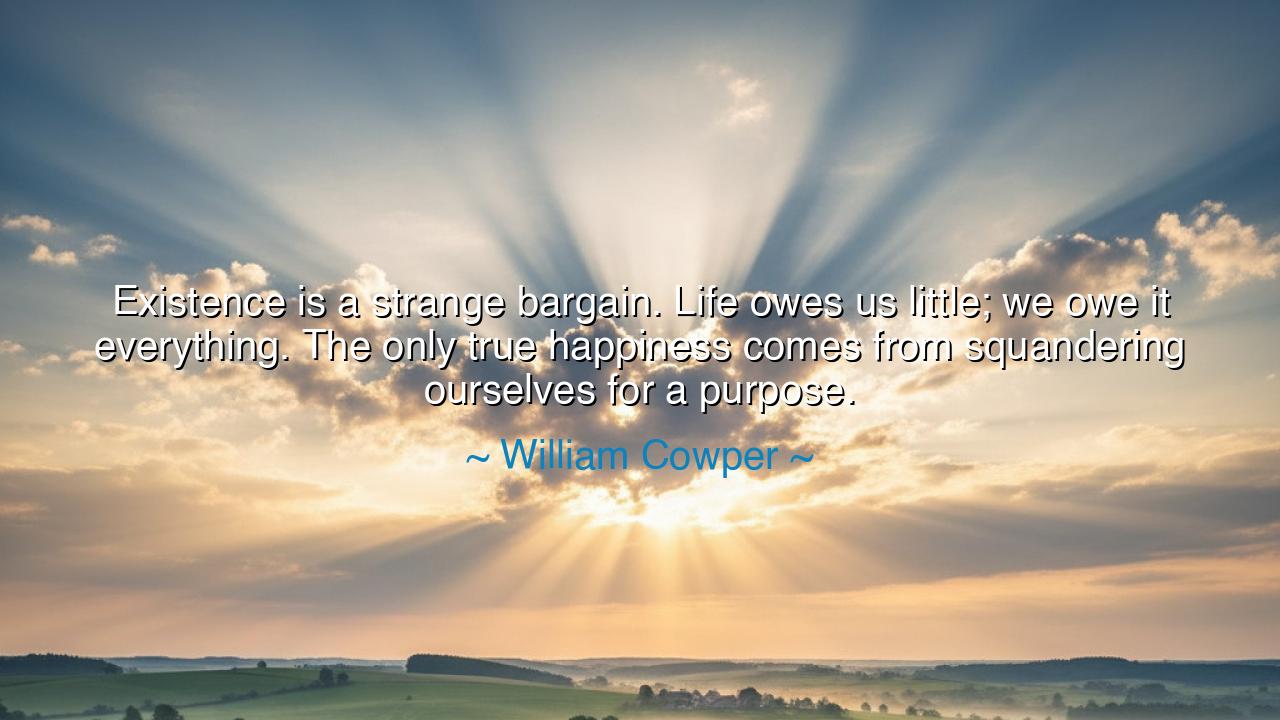
Existence is a strange bargain. Life owes us little; we owe it
Existence is a strange bargain. Life owes us little; we owe it everything. The only true happiness comes from squandering ourselves for a purpose.






“Existence is a strange bargain. Life owes us little; we owe it everything. The only true happiness comes from squandering ourselves for a purpose.” – William Cowper
In these solemn and stirring words, William Cowper, the poet of conscience and contemplation, speaks to the eternal mystery of existence — the sacred exchange between life and the soul. He calls it a strange bargain, for indeed, it is not equal: we come into this world with no promises, no guarantees, no debts owed to us by creation. Life offers no assurance of ease, comfort, or fairness. And yet, in our pride, we often demand these things — we feel betrayed when the path grows hard. Cowper, who knew deeply the weight of sorrow and the light of faith, reminds us that the greater truth is the opposite: life owes us little, but we owe it everything. To live fully, we must give of ourselves completely.
This bargain is strange because it asks us to give without expectation of return. The universe does not flatter us with fairness; it tests us with meaning. Our task is not to receive happiness, but to create it, through effort, devotion, and purpose. Cowper’s life itself was marked by immense suffering — the shadow of depression, the struggle for peace, the battle between despair and belief. Yet even amid his anguish, he found beauty in service to something beyond himself: the act of creation, of giving his words to others. In his poetry, he poured his spirit into truth, and in that self-squandering, he found what he calls the only true happiness — the joy of living not for pleasure, but for purpose.
To squander oneself for a purpose may sound reckless to those who seek safety. Yet it is the very essence of greatness. For what is love if not a holy waste of the self? What is art, or faith, or heroism, if not the surrender of one’s comfort for something larger than one’s life? The river does not hoard its waters; it spends them freely upon the land, and in that giving, it nourishes everything it touches. So too, the human spirit was not made to conserve itself, but to pour itself out — to exhaust its strength in service to what is good, beautiful, and true. Those who cling to self-preservation live small and afraid; those who give themselves away become vast and enduring.
History remembers Florence Nightingale, who left the luxuries of her upbringing to labor among the dying in the Crimean War. Surrounded by blood, disease, and despair, she did not shrink. Her days were long, her nights sleepless, yet her heart burned with the fire of purpose. She gave her time, her health, even her peace of mind — she squandered herself for a purpose. And in that sacrifice, she found a joy beyond comfort: the joy of knowing her life was a lamp that lit the way for others. Such is the strange arithmetic of existence — that what we give away in love multiplies in meaning, and what we hoard in fear decays into emptiness.
Cowper’s words also warn us against the illusion of entitlement. Many live believing that life owes them happiness, that the world should bend to their desires. But happiness cannot be demanded like tribute; it must be earned through giving. The man who expects life to serve him grows bitter; the one who serves life grows fulfilled. The bargain is not unfair — it is divine justice. For in surrendering our ego, we gain something far greater than comfort: we gain significance.
There is a nobility in this truth, a call to live as the heroes of old lived — not for the ease of existence, but for the glory of purpose. The ancient warriors did not measure their lives by years, but by deeds. The saints did not seek pleasure, but peace through service. And even the humble laborer, when he works with honesty and heart, joins this same lineage — for he too gives himself to life without demand, and finds quiet joy in his toil. It is not the scale of the purpose that matters, but the sincerity with which we serve it.
So, my children, remember Cowper’s teaching: do not ask what life owes you, for it owes you nothing. Instead, ask what you can give to it, and give freely. Let your energy, your talent, your love be spent — not hoarded. The candle fulfills its meaning not by remaining whole, but by burning. When you give yourself wholly to a purpose, you do not lose yourself; you are transfigured. The strange bargain of life becomes clear — that the more we give, the richer we become, and the more we serve, the happier we are. For true happiness lies not in what we keep, but in what we give away for something greater than ourselves.






AAdministratorAdministrator
Welcome, honored guests. Please leave a comment, we will respond soon